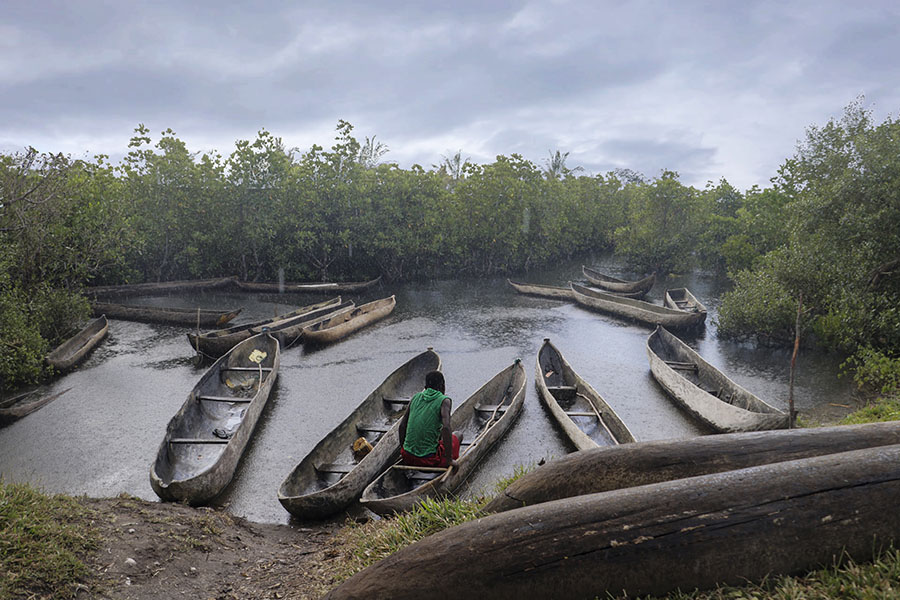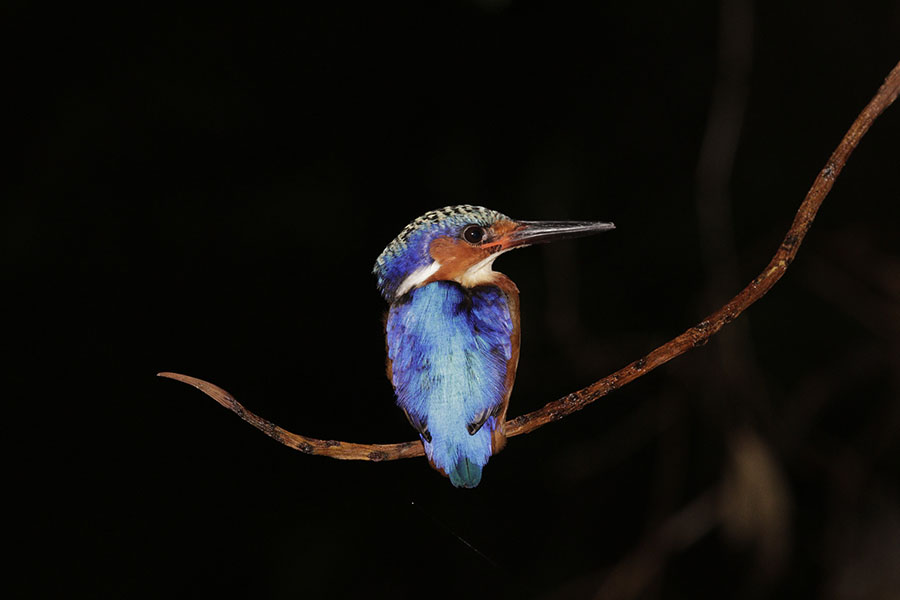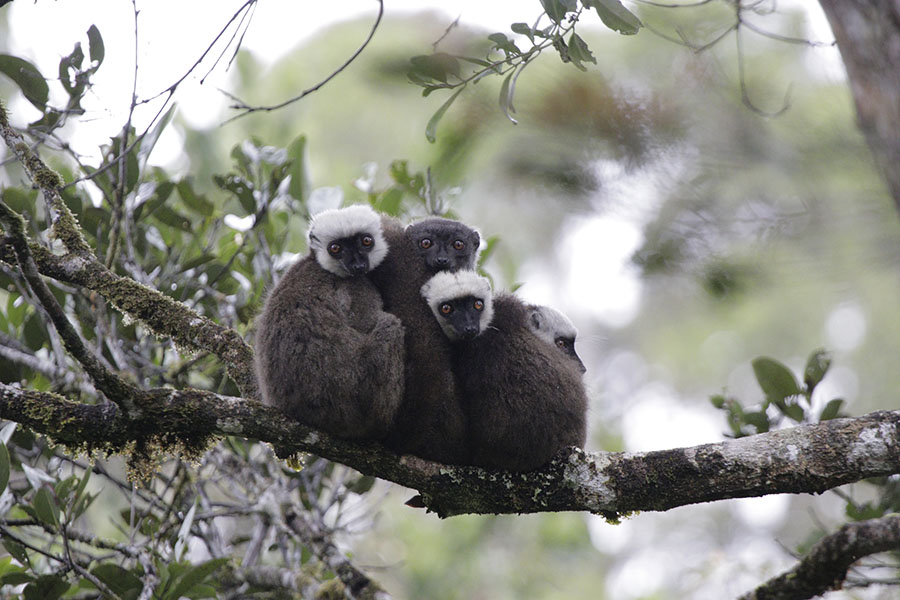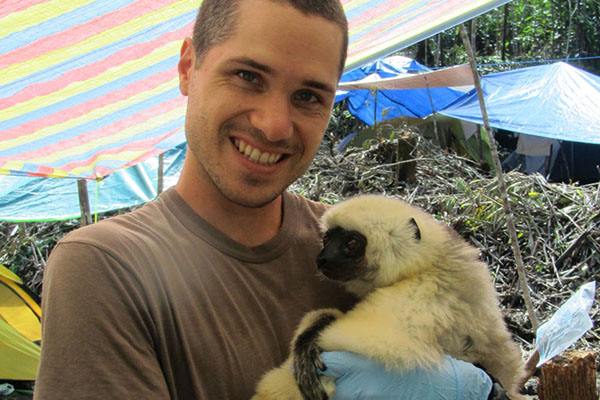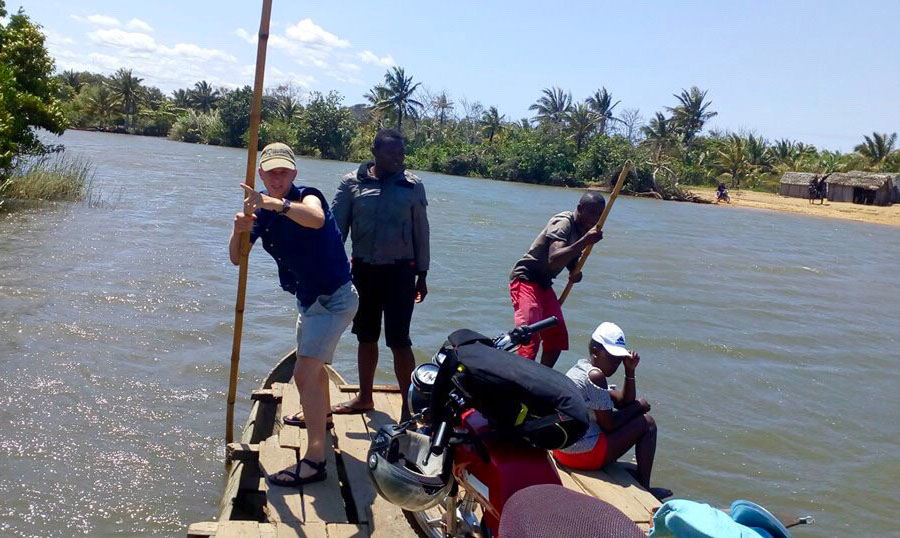
Senior sustainable development major Patrick Ross, far left, helps others paddle a raft transporting motorcycles off of Cape East, which is located on Madagascar’s Masoala Peninsula. Ross traveled to Madagascar in November 2018 to conduct a biodiversity assessment as part of his Gilman Scholarship. Photo by Barry Ferguson
BOONE, N.C. — Unbeknownst to the small carnivores who call Madagascar’s Anjanaharibe-Sud Special Reserve home, the eyes of an Appalachian State University student are watching — with conservation in mind.
Through the support of a Benjamin A. Gilman International Scholarship, Appalachian senior Patrick Ross, a sustainable development major from Durham, traveled to the remote forest of Anjanaharibe-Sud Special Reserve in November 2018. There, Ross conducted a biodiversity assessment to catalog small carnivores that live in the rainforest.
The Gilman International Scholarship Program, funded by the U.S. Department of State, offers grants of up to $5,000 to allow U.S. undergraduate students from diverse backgrounds to participate in credit-bearing study abroad programs and career-orientated internships. The program seeks to support students who might not otherwise participate due to financial barriers.
With the Lemur Conservation Foundation (LCF) willing to fund a large part of his project, Ross approached Dr. Zach Farris, an assistant professor in the Beaver College of Health Sciences’ Department of Health and Exercise Science and a leading researcher in carnivore ecology, specifically focusing on Madagascar.
Impressed with Ross’ idea and ambition, Farris met with Ross numerous times to develop, design and prepare the complex project, loaning him several trail cameras for his trip.
“Patrick worked closely with myself and other mentors to acquire maps and imagery to design his sampling grid. He raised funds and wrote grants to purchase equipment. He and I drafted, submitted and were granted a permit by Madagascar National Parks to allow the first survey of this newly protected area, and he organized and led a team of Malagasy researchers to conduct his survey,” Farris said. “His work has resulted in hundreds of thousands of data points, which he is currently entering and beginning to analyze.”
Ross, whose passion for Madagascar stems from his work as a volunteer field guide for the Duke Lemur Center, said carnivores are often the most at-risk animals in situations of forest degradation, so knowing how many and what type are currently present will help researchers and conservation organizations see change over time.
He placed the cameras, which are motion and heat activated, in various areas throughout the forest during his monthlong trek in November 2018. The cameras will continue running until the study concludes in March. According to Ross, this is the first and longest assessment of its kind, and preliminary results show there are at least three carnivores that exist in the forest.
“This unforgettable experience sets up him exceedingly well for almost any graduate program in the world,” Farris said. “Patrick will have international field experience leading a research team in a remote, undeveloped part of the world, grant writing experience, experience working with a foreign government to acquire research permits, numerous professional presentations, and he will be an author on at least two scientific publications.”

This photo captures dawn off the coast of Sambava, a city and commune on the east coast of northern Madagascar. After Ross conducted a biodiversity assessment in Madagascar’s Anjanaharibe-Sud Special Reserve, he spent three weeks in Sambava performing a project debrief and compiling his initial results. Photo by Patrick Ross
Ross, who is one of 835 undergraduate students from 310 colleges and universities across the United States selected to receive the prestigious Gilman Scholarship, said the experience has deepened his understanding of the rainforest and increased his enthusiasm for additional research.
“I want to conduct more assessments and continue research and action toward applied conservation. Ideally, I’ll head back to Madagascar this summer. It’s an amazing place and I’m grateful for the opportunity,” Ross said.
For more information about the Gilman Scholarship Program and how to apply, contact Nationally Competitive Scholarships at [email protected] or visit https://ncs.appstate.edu.
What do you think?
Share your feedback on this story.
About the Goodnight Family Department of Sustainable Development
One of seven departments housed in the College of Fine and Applied Arts, the Goodnight Family Department of Sustainable Development at Appalachian State University prepares students to thoughtfully analyze human development while focusing on the applied practice of pursuing transformative, community-driven development and social change. It offers a Bachelor of Science degree in sustainable development with concentrations in agroecology and sustainable agriculture; community, regional and global development; and environmental studies; as well as a Bachelor of Arts and minor in sustainable development. Learn more at https://sd.appstate.edu.
About the College of Fine and Applied Arts
Appalachian State University’s College of Fine and Applied Arts is a dynamic and innovative group of seven academic departments, bringing together a variety of perspectives, experiences and real-world education to provide unique opportunities for student success. The college has more than 3,500 undergraduate and graduate majors. Its departments are Applied Design, Art, Communication, Military Science and Leadership, Sustainable Development, Sustainable Technology and the Built Environment, and Theatre and Dance. Learn more at https://cfaa.appstate.edu.
About the Beaver College of Health Sciences
Appalachian State University’s Beaver College of Health Sciences (BCHS), opened in 2010, is transforming the health and quality of life for the communities it serves through interprofessional collaboration and innovation in teaching, scholarship, service and clinical outreach. The college enrolls more than 3,600 students and offers 10 undergraduate degree programs, nine graduate degree programs and four certificates across seven departments: Kinesiology, Nursing, Nutrition and Health Care Management, Public Health, Recreation Management and Physical Education, Rehabilitation Sciences, and Social Work. The college’s academic programs are located in the Holmes Convocation Center on App State’s main campus and the Levine Hall of Health Sciences, a state-of-the-art, 203,000-square-foot facility that is the cornerstone of Boone’s Wellness District. In addition, the college supports the Appalachian Institute for Health and Wellness and has collaborative partnerships with the Wake Forest University School of Medicine’s Physician Assistant Program, UNC Health Appalachian and numerous other health agencies. Learn more at https://healthsciences.appstate.edu.
About Nationally Competitive Scholarships
Nationally Competitive Scholarships (NCS) works with the Appalachian community to recruit and support students for nationally competitive scholarships and fellowships, including those that support research, teaching and critical language learning. This is achieved with outreach, mentorship and advising throughout the entire application and selection process. NCS is committed to helping undergraduate and graduate students find ways to connect their Appalachian education to their future endeavors through scholarship opportunities. Learn more at https://ncs.appstate.edu.
About Appalachian State University
As a premier public institution, Appalachian State University prepares students to lead purposeful lives. App State is one of 17 campuses in the University of North Carolina System, with a national reputation for innovative teaching and opening access to a high-quality, cost-effective education. The university enrolls more than 21,000 students, has a low student-to-faculty ratio and offers more than 150 undergraduate and 80 graduate majors at its Boone and Hickory campuses and through App State Online. Learn more at https://www.appstate.edu.
